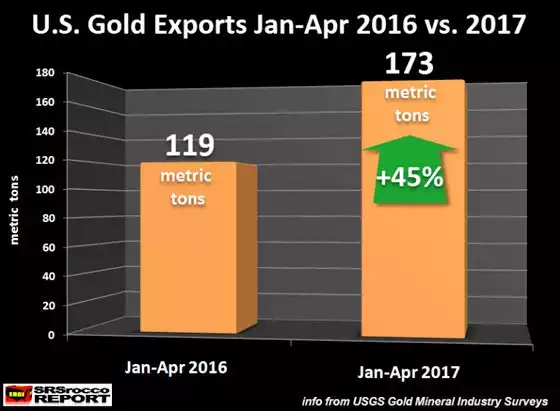Asymmetric Opportunities Require Discipline
News
|
Posted 07/07/2017
|
6397
It may not be a surprise to learn that the US is currently in a gold trade deficit. Gold exports from the US for the first four months of the year totalled 174mt where imports tallied 88mt with a 77mt import figure totalling 165mt. In fact, the quantity of gold leaving the US surged by 45% during the first four months of 2017 when compared with the same period in 2016 as pictured below.

According to Steve St. Angelo, “Hong Kong and India received 51%, while Switzerland and the U.K. received 43% of the total. However much of the gold that is exported to Switzerland and the U.K makes its way to China, India or other Asian countries”.
This is an important dynamic as it illustrates the psychological differences applied to investing in the East. The West is typically frustrated by low gold prices due to a tendency to focus on shorter term gains whereas the East relishes them, opting to view gold purchasing as a long term prospect and buying on price dips.
How could the Eastern approach be of benefit? Well the short answer is dip-buying and long term holding allows for the best exploitation of asymmetric trades. What are asymmetric trades? David Smith of Money Metals News Service defines them as “a situation where investing a relatively small amount of money holds the potential of yielding a profit many times the amount of the original sum at risk. In other words, where the risk to reward is skewed massively in the direction of reward”.
On Wednesday we looked at the concept of wealth transfers and explored with the help of Incrementum’s research how gold is poised to benefit from such conditions as a highly undervalued asset. It is a good example then of an asymmetric trade.
We’ve seen asymmetric trades pay off recently with the explosion in the Bitcoin price (see the one year plot below in AUD), hotly followed by Ethereum and some of the alternative (so called “alt”) coins. Similar prior examples can be seen in the equity space with insightful allocations of funds made years ago into the FANG or FAMGA stocks (Facebook, Amazon, Netflix, Google or Facebook, Apple, Microsoft, Google, Amazon respectively) returning hundreds of percent.

David Smith discusses two important factors to consider regarding asymmetric trades. Firstly, there has never been a time when the world has been so awash with funds looking for a place to go. From the personal investor, through the array of professional investment entities, banks and up to the scale of countries, the investment dollar now truly has a global audience. As such, there is a lot of potential energy just waiting to be released. This coupled with the speed at which information and money now travel means that breakouts can occur much more quickly. To exemplify, David states that “It took over two decades for Microsoft to "do its thing." Amazon? Arguably about 15 years.”
Secondly David discusses the tendency to sell early into an asymmetric price breakout. The following quote illustrates this for the USD price action in Ethereum.
“In January, 2017, ETH could be had for $10 each. By $50, the charts and many soothsayers said that it was ‘grossly overbought.’ Time to cash out? Today ETC sells for $328 each.”
Selling early is a psychological factor that takes experience and discipline to navigate. David’s suggestion is to prepare by establishing first what an investor considers their “core component holdings” (longer term holdings for the purpose of hedging, inflation mitigation or insurance) versus the “speculative component holdings” (something to liquidate at strong price points). This preparation will provide an investor with the best chance to ride asymmetric breakouts for as long as possible.
Seeing buying opportunities in depressed assets and holding them for potential future breakouts is not something the Western investor is typically geared towards and the ongoing migration of gold out of the West is a great example of the opposite mindset typically held in the East. Regardless of the approach, a balanced diversification into metals is a prudent thing to do.